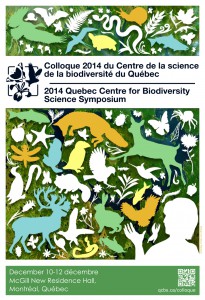The event will be held at the New Residence Hall of McGill University on December 10, 11 and 12, 2014.
The 3-day event is open to everybody
Breakfast, lunch, and coffee breaks are covered for each of the 3 days and networking cocktails for Dec. 10 and Dec. 11.
Click here to access the complete program
Click here to access the booklet of the Symposium 2014
The winners of the QCBS symposium prizes!
The QCBS would like to congratulate the following QCBS students for receiving the 2014 Symposium prizes:
- QCBS prize: Marie-Helene Brice (UdM) – “Le rôle de l’urbanisation, des inondations saisonnières et des processus spatiaux dans la structuration des communautés fonctionnelles dans les forêts riveraines”
- 1st place for best presentation: Jeremy Brammer (McGill) – “The population dynamics of muskrat in the western Canadian Arctic”
- 2nd place for best presentation: Emmanuelle Chrétien (McGill) – “Performance aérobie et tolérance thermique maximale de la perche du Nil (Lates niloticus) en fonction de leur taille et de leur sélection d’habitat” – and Gabrielle Dubuc Messier (UQAM) – “Hétérogénéité environnementale et évolution des traits de personnalité chez la mésange bleue (Cyanistes caeruleus)”
- 1st place for best poster: Felipe Dargent (McGill) – “Mixed-species group formation as an antiparasite strategy: who benefits?”
- 2nd place for best poster: Melanie Louise Leblanc (McGill) – “Cree experts and researchers team up to better understand Brant response to eelgrass decline along the eastern coast of James Bay”
The winners of the photo contest!
According to a public vote, the winning pictures were:
- Nature: Filtering the colour by Aaron Eger
- Scientists at work: Répit à l’Ougandaise by Vincent Fugère
- Social life: Conservation through education by Olivier Samson-Robert
Congratulations!!
The first day is dedicated to a workshop on “Linking biodiversity science to the sustainability agenda”
The workshop will be a forum to evaluate and strengthen the role of biodiversity science in attaining local, regional and international goals for sustainable development. The event will 1) present perspectives from the researchers and stakeholders, and 2) foster dialogue between participants to achieve the shared knowledge needed to attain sustainable development targets.
Presentations confirmed by:
- Robert Siron, (OURANOS) Linking climate change, biodiversity and sustainability
- Robert Hoft, (CBD-UNEP) Aichi targets and sustainable development goals
- Catherine Potvin, (McGill) Dialogue on sustainability
- Andrew Gonzalez, (McGill) Biodiversity science and Future Earth
- Hugo Robitaille, Réseau environnement – VP secteur biodiversité), biodiversity from a private sector and municipalities perspective
- Caroline Sanchez Valero, Réseau environnement, Directrice secteurs techniques et programmes
- Mélanie Rousselle, Conférence régionale des élus de Montréal
- Marie-Claude Lemieux, WWF Canada
A world cafe session will offer the participants the opportunity to share their knowledge and co-create ideas to advance collaboration and partnerships.
Some questions to be addressed:
- What are the issues in linking biodiversity science to the sustainability agenda: identify issues and problems to address?
- What are the key resources (funding and people) needed to address them?
- What are the new multi-stakeholder projects that research networks, like the QCBS, can develop and support with what partners?
The following two days will be dedicated to the 2014 QCBS symposium. 
Our guest speaker: Professor Graham Bell
Dr Bell is currently a professor and Chair of the Department of Biology at McGill University. He was appointed to the Molson Chair in Genetics at McGill in 1992, elected to the Royal Society of Canada in 1994, elected President of the Canadian Society for Ecology and Evolution in 2006, and most recently, he was elected to the American Academy of Arts and Sciences for 2014. He also received several awards, including the NSERC Award of Excellence (2007) and NSERC Herzberg Medal (2008). He is currently the President-elect of the Royal Society of Canada.
His current 5 year-long research focuses on adaptation, extinction and global change in order to study the ways in which populations adapt and evolve in response to a changing environment. His research aims to predict how populations will respond to rapid environmental change.
The following is providing you with an idea of the program to come:
- research presentations (60)
- speed talks (16)
- Poster session (37 posters)
- panels (3):
- Environmental Innovation training and research program, QCBS and the NSERC CREATE which aims at enhancing Canada’s prosperity through innovative environmental assessment, monitoring and management are organizing a panel following QCBS students’ request. It will be the occasion for biodiversity professionals to share their experience with QCBS students.
- Murray Humphries, McGill University
- Aynslie Ogden, Yukon government senior science advisor
- Corey De La Mare, Golder associates
- Special session on ecosystem accounts for Quebec
- Stephanie Hude, Institut de la Statistique du Quebec
- Anthony Kerebel, Centre d’étude de la forêt, Université Laval
- Mark Henry, Statistiques Canada
- Jérôme Dupras, Institut des sciences de la forêt tempérée, UQO
- Next Generation Uses of Biodiversity Data
- Anne Bruneau, Université de Montréal
- Dominique Gravel, UQAR
- Jesse Shapiro, Université de Montréal
- Virginie Millien, McGill University
- Colin Favret, Université de Montréal
- Patrick James, Université de Montréal
- Jean Philippe Lessard, Concordia University
- Environmental Innovation training and research program, QCBS and the NSERC CREATE which aims at enhancing Canada’s prosperity through innovative environmental assessment, monitoring and management are organizing a panel following QCBS students’ request. It will be the occasion for biodiversity professionals to share their experience with QCBS students.
- Photo contest (25-30 photos)
To add on to the past efforts by QCBS students in having a more eco-responsible event, the QCBS organized a training workshop for QCBS students. They will then be part of the team working on the certification of the event (Norme BNQ 9700-253 Développement durable – Gestion responsable d’évènements)


